Zika virus: Mothers tell their stories - 'The legacy will shame Brazil for years to come'
Hundreds of Brazilian mothers have joined forces to form a support group, Maes de Anjos Unidas, or United Mothers of Angels

Your support helps us to tell the story
From reproductive rights to climate change to Big Tech, The Independent is on the ground when the story is developing. Whether it's investigating the financials of Elon Musk's pro-Trump PAC or producing our latest documentary, 'The A Word', which shines a light on the American women fighting for reproductive rights, we know how important it is to parse out the facts from the messaging.
At such a critical moment in US history, we need reporters on the ground. Your donation allows us to keep sending journalists to speak to both sides of the story.
The Independent is trusted by Americans across the entire political spectrum. And unlike many other quality news outlets, we choose not to lock Americans out of our reporting and analysis with paywalls. We believe quality journalism should be available to everyone, paid for by those who can afford it.
Your support makes all the difference.It should have been a joyful celebration for both Vanessa Oliveira and Thais Battistot. But like thousands of women across the South American continent, the two Brazilian mothers have had to come to terms with one of the most heartbreaking revelations – that their newborn arrivals have microcephaly.
Throughout their pregnancies, neither women was alerted to the risks of their foetuses developing the abnormality of a smaller head and underdeveloped brain, nor to the risk of associated neurological problems.
“I caught Zika sometime in the first four months of my pregnancy,” said Oliveira, 36, whose baby Maria Clara is three months old. “Nobody had a clue at the time that the red rash on my skin and itching would have such devastating consequences,” said the mother-of-two, who has a nine year old daughter.
Oliveira, who lives in Sergipe, north-east Brazil, said: “The frustrating thing was that I was closely monitored throughout my pregnancy because I suffered from pre-eclampsia, but no doctor spotted the changes in my baby’s development.”
For 25-year-old Thias Battistot, a housewife who lives with her husband in Campo Grande, Mato Grosso do Sul in the south of Brazil, the shock of giving birth to a baby with developmental difficulties left her crying for weeks. “Emanuelle suffers from a mild form of the disease but it was only diagnosed when she was seven months old,” Battistot said. Now 10 months old, Emanuelle has been diagnosed with motor neurone problems.
“At first I thought Emanuelle was just a tiny baby but I noticed she wasn’t developing like my nephew of the same age,” she said. “At four months she couldn’t sit down properly and was very floppy and didn’t move around a lot.”
Emanuelle’s deformity is not visible in the circumference of her head, unlike Maria Clara who has suffered the stunted head growth associated with the virus. Instead, Emanuelle’s illness has affected her co-ordination and neural skills.
“Two weeks after her diagnosis the media exploded with the news of the link between the Zika virus and microcephaly,” recalled Battistot.
For Oliveira the missed diagnosis is unsurprising as the connection between Zika virus and microcephaly was only discovered in Brazil at the end of last year. She revealed that she had gone through a raft of emotions from shock and anger, through to acceptance and resignation – and now to a determination to fight for the best results for her child.
“I spent ages blaming myself, the government and questioning why me,” she said. “But then I realised that my baby needed me and I couldn’t wallow in self-pity. Maria Clara needs constant stimulation and if I neglect this she will suffer.”
The two women have joined forces with hundreds of other Brazilian mothers across the country to form a support group, Maes de Anjos Unidas (United Mothers of Angels). “Sadly the numbers are growing every day and we are trying to pass on our experiences of how to cope,” she said.
Both families have monthly physiotherapy sessions for their babies but are demanding compensation from the government, developmental support for their children in local hospitals, and psychological help for families.
“We shouldn’t have to be doing this ourselves,” declared Oliveira. “But as this country hasn’t got a clue what it’s doing we have no choice. You love your child anyway. But now with the intensity of care you have to give, you love your baby three times as much.”
Battistot agrees: “I can’t give up, but I’m not prepared to accept it without a fight. This legacy will shame Brazil for years to come but we’ll never allow it to make us ashamed of our children.”
Join our commenting forum
Join thought-provoking conversations, follow other Independent readers and see their replies
Comments